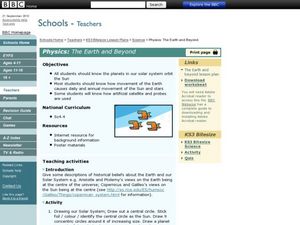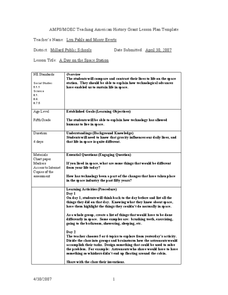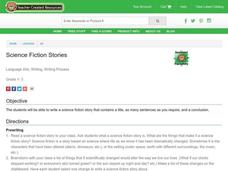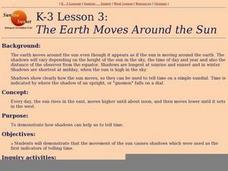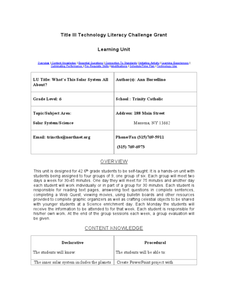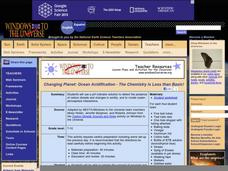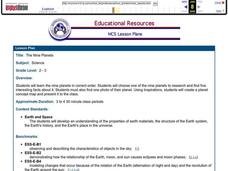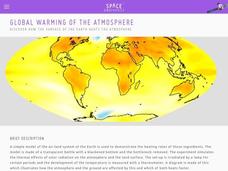Curated OER
Sustainable Southern Belize: Coral Health Lesson Plan
Fifth graders investigate coral reefs and the dangers they face by labeling and drawing. In this oceanography lesson, 5th graders view a PowerPoint presentation of photographs of coral reefs in Belize. Students investigate...
Curated OER
Science NetLinks: Fossils and Geologic Time
High schoolers investigate the development of the geologic time scale. Also, to introduce them to the major time periods in earth's history, as well as to the role fossils play in helping us understand this history.
Curated OER
Earth's Hydrologic Cycle
Learners examine the water cycle. In this hydrologic cycle lesson plan, students follow the provided procedures to demonstrate the how water moves around the planet through the dynamics of the water cycle.
Curated OER
Physics The Earth and Beyond
Fourth graders will explore our solar system. In this physics instructional activity students create a model of the solar system to explore the movement of Earth, the Sun, and stars.
Curated OER
A Day on the Space Station
Fifth graders discover what it would be like to live in space. In this technological advancements lesson plan, 5th graders discuss how space life would be different from Earth life. Students also identify how technology has made life in...
Curated OER
The Day an Egg Solved the Mystery of the Cell
Students conduct an experiment comparing human cells to chicken cells. In this cells lesson plan, students conduct an experiment to see how nutrition moves through cells and how to better take care of their bodies.
Curated OER
What's Your Sign? The Science Behind The Zodiac
Students investigate the concepts dealing with the motions of celestial objects, the ancient origins of the Zodiac and the science behind the Zodiac.
Curated OER
Science Fiction Stories
Students review the story writing process and the elements such as prewriting, drafting, editing, revising, publishing, and assessment. Next students write a science fiction story that contains a title, the requested number of...
Curated OER
Activity Plan Mixed Ages: Sunny Science
Students develop problem-solving, observation, and critical-thinking skills. For this early childhood lesson, students explore the topic of the sun as they notice shadows and light.
Curated OER
The Earth Moves Around the Sun
Students demonstrate that the movement of the sun causes shadows which were used as the first indicators of telling time.
Curated OER
Ecosystems Lesson Plan
Students research ecosystems (rainforest, desert, grassland, woodland, and arctic tundra). Students compare the seven continents and the importance of proximaty to the equator.
Curated OER
An Internet Lesson on the Planets
Sixth graders research one of the planets in the solar system based on questions that they develop using information from the Internet. They create a travel brochure using the research information.
Curated OER
Reproduction, Day 3: Parenthood
Teenagers explain the process from making the decision to have a baby to parenthood. They identify the positive and negative aspects of parenting. In small groups, they browse catalogs of baby equipment and evaluate the cost of...
Curated OER
What's This Solar System All About?
Sixth graders complete a unit of lessons on the solar system. In small groups, they participate in a Webquest, watch movies, complete graphic organizers, and answer questions, create a model of the planets, and develop a Powerpoint...
Curated OER
Our Space Station Earth
Learners discover ways to preserve the Earth's resources. In this natural resources activity, students investigate how many gallons of water the average American uses per day and then total their estimated usage. Learners discuss the...
Curated OER
Phases of the Moon
Sixth graders learn that the moon orbits the Earth in a predictable cycle. Each learner engages in a two-week observation of the moon. They sketch its appearance, and take note of its position in relation to objects in their yard. Some...
University of Colorado
The Jovian System: A Scale Model
Jupiter has 67 moons! As the seventh in a series of 22, the exercise shows learners the size and scale of Jupiter and its Galilean moons through a model. They then arrange the model to show how probes orbited and gathered data.
US Environmental Protection Agency
Weather and Climate: What's the Difference?
Future weather forecasters collect daily temperatures over a period of time. Afterward, they compare their data with monthly averages, as researched on national weather websites, in order to grasp the difference between weather and...
Curated OER
Weather, Sea Level Rise and Climate Change
Students differentiate weather and climate. In this earth science instructional activity, students compare weather and climate in different regions of the world. They interpret weather graphs and compare isotherm lines of northern and...
Curated OER
Changing Planet: Ocean Acidification - the Chemistry is Less than Basic!
A video and laboratory investigation are highlights to this lesson on acidification of ocean water due to increased atmospheric carbon dioxide. Using bromothymol blue (BTB) as an indicator, pupils analyze the amount of carbon dioxide...
Curated OER
The Nine Planets
A solid lesson on teaching the nine planets in our solar system is here for you. In it, young scientists learn the correct order of the planets, and they choose one of the planets to do a research report on. They must come up with five...
Teach Engineering
Air Under Pressure
Introduce your class to air masses and how they affect the weather with a lesson plan that focuses on the differences between high and low air pressure systems. The class explores actual weather data using archived weather data.
Space Awareness
Global Warming of the Atmosphere
Scientists know the amount of carbon dioxide in the atmosphere today is higher than at any point in the last 800,000 years. Scholars learn about the amount of thermic radiation absorbed by air and what happens to the rest of the...
Curated OER
Tides - The Ins and Outs of Tides
Get your junior oceanographers to generate tidal prediction graphs on an interactive website. They will feel like experts in the field, or shall we say, experts in the ocean! This is a brief, but worthwhile activity that could be used to...





